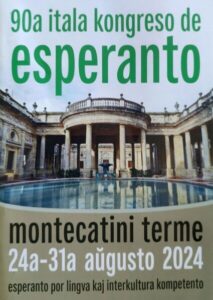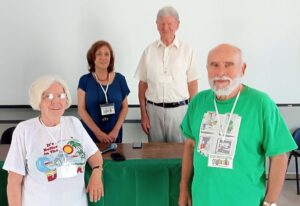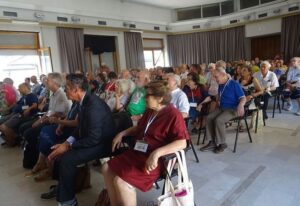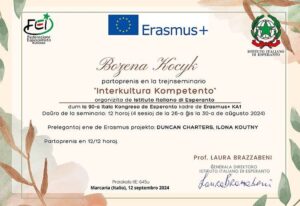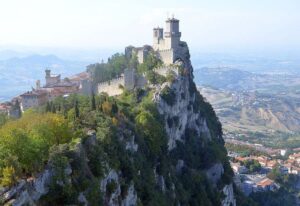From August 24th to 31st, the 90th congress organized by the Italian Esperanto Federation took place in Montecatini Terme near Florence. More than 200 people participated, with Poles being the second-largest national group in terms of numbers.
The program was, as usual, rich: serious and lighter lectures, workshops, concerts, and a wide selection of excursions. The main theme of the congress, as well as the focus of the main seminar, was “Esperanto as a tool for increasing linguistic and intercultural competencies. It was led by Duncan Charters, president of the Universal Esperanto Association since 2019, and Professor Ilona Koutny from Adam Mickiewicz University in Poznań.
Unfortunately, the Interlinguistic Studies in Esperanto, conducted by Professor Koutny, will end this year. Similarly, Arkones – the Art Esperanto Days in Poznań – took place for the last time. Thus, two important elements of the Esperanto movement have disappeared from the events calendar.
Among the many lectures, one could choose, for example, “Esperanto in Madagascar” by Ulrich Matthias or “The Real Situation in Ukraine: Experiences and Reflections” by Evheno Kovtonjko.
Every morning in the park, yoga exercises and meditation were held, led by Clarissa Sabatini (in the evenings, she also played the harp, guitar, and sang). The evenings, traditionally dedicated to music, were enriched by giants like JoMo – a French singer and guitarist who inspired everyone to dance and sing, and “Kajto” – a Dutch duo playing many instruments and singing not only in Esperanto.
It’s just a pity that the final concert was so deadly serious, with such an ambitious musical-poetic repertoire that many people left during the performance. Somehow, Italian Esperantists don’t seem to understand (the same thing happened at the World Congress in Turin) that the congress participants are a very diverse, international audience, not just connoisseurs of very serious music and symbolic, difficult poetry, most expect lighter entertainment, which doesn’t mean a lack of quality.
Nevertheless, the congress fulfilled its most important role of integrating the Esperanto community and providing an opportunity to meet new and old friends. Let’s hope there will still be people with enough enthusiasm, strength, and time to organize such events.
Bożena Kocyk
